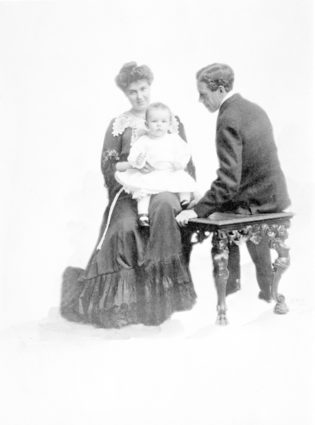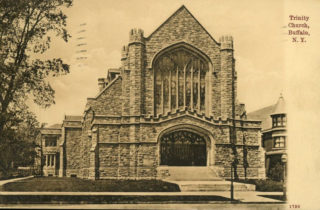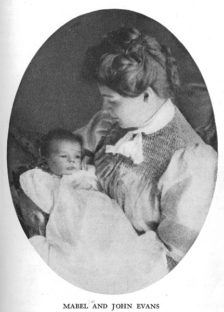by Elizabeth Cunningham
With Karl, I lived into the fun of outdoor life, horses and dogs, and motorboats…. He talked to me about shooting, of hunting ducks and rabbits, and he fascinated me with stories of the Indians.

Mabel, John, and Karl Evans, 1902. Mabel Dodge Luhan Papers, Beinecke Rare Book and Manuscript Library, Yale University
Mabel’s second memoir, European Experiences, relates the story of her marriage to Karl Evans. In Buffalo, eager to test her womanly powers, Mabel flirted with Karl Evans of her country club set. He was already engaged to one of her friends. “I had no thought of marrying him, but only of keeping him from Elsie.” The flirtation grew into an obsession for Karl. He broke with Elsie to court Mabel.
Karl opined that he and Mabel would make a wonderful couple. They could have a good time because they liked the same things. Mabel agreed about that. However, Karl didn’t like all the things Mabel did. “He didn’t even know how I loved reading, and strange, beautiful things for house, or that I had many far thoughts of a life he could never touch.” The thoughts she referred to comprised la grande vie interieur or the cultivation of an inner life of spiritual beauty. Mabel’s beloved Violet Shillito had introduced this notion. Along with pursuing art “for life’s sake”, this became Mabel’s life quest. She didn’t divulge this to Karl or anyone else. “I learned very early to talk to people only of the things they know about and liked and never to try to tell them all that I carried locked up in me.”

Trinity Church, Buffalo, NY 1907
When Mabel told her father of their pending engagement, he flew into a rage. He forbade her to marry Karl. Defying her father, Mabel became engaged. In July 1900 Karl took matters into his own hands. He arranged an outing with Mabel on the pretext of visiting his family’s country house on the Niagara River. Instead, they arrived at a small county church where a minister awaited them. Mabel later commented: “I was married—the passive, truly female experience.” Learning of their secret elopement weeks later, Mabel’s mother staged an “official” wedding at Buffalo’s Trinity Church. Family and hundreds of friends attended the October ceremony.

Mabel and John Evans, from European Experiences, Volume Two of Intimate Memories, 1935
Pregnant the following year, Mabel experienced the most contented period of her life. “It was so wonderful to give up—to lose completely my sense of individual life.” After the birth of her son John in January 1903, Mabel lost her sense of equipoise. Instead of fulfillment, marriage and motherhood created discontent. Her malaise increased with the death of her father that November and an operation to repair physical damage sustained from John’s birth. Still recuperating, Mabel learned that Karl had been shot in the back in a hunting accident. She rushed to his hospital bed, arriving in time to hear his last words. He died on February 25, 1904—one day before Mabel’s 25th birthday—leaving her a sudden widow with a one-year-old son. All of this trauma was compounded by the airing of Mabel’s secret affair with the Evans’ family doctor, the prominent John Parmenter, in the months following Karl’s death. Bundled off to New York, she barely survived a nervous breakdown. In July Sara Ganson sent her daughter and grandson off to Europe.